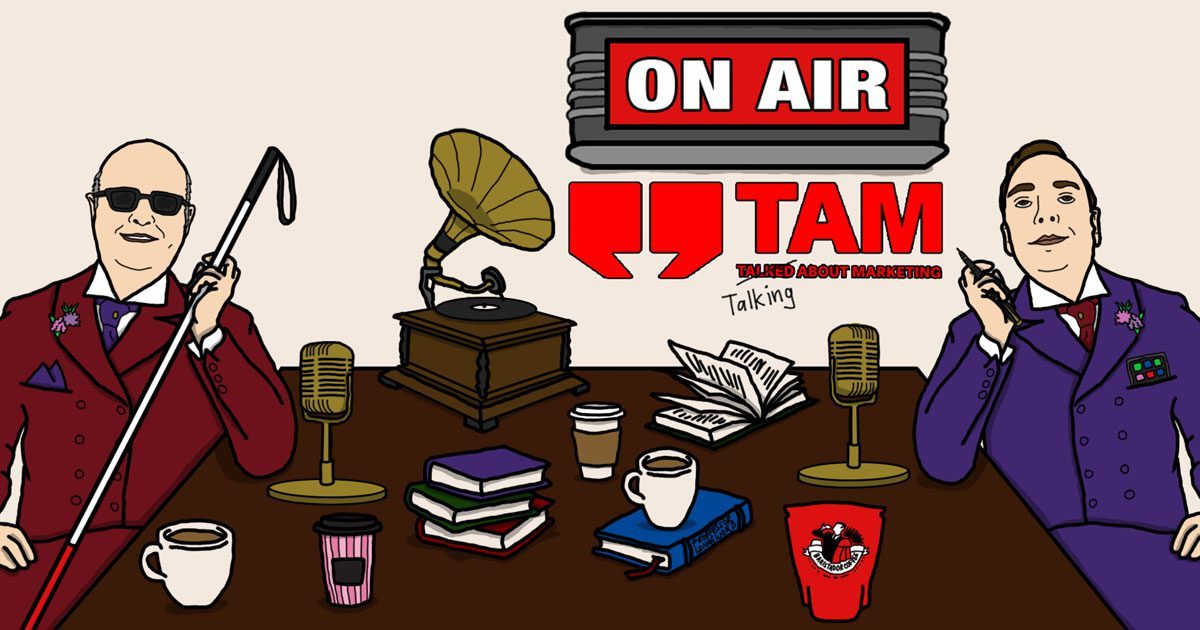Why should you not be unnecessarily anxious about undertaking a new activity? Because you already have valuable experience, skills, and mentors, which means you never start from zero.
In this second episode of the third series of Talking About Marketing, we turn our attention to acknowledging the inner potential we all have, individually and in teams, when it's time to embark on new tasks or projects or opportunities.
To that end, David mines the work of Kathryn D. Cramer.
For the Person segment, however, Steve taps into the work of Bill Bryson, who has thoughtfully mined the work and lives of many people throughout history in his mini tome, A Short History Of Nearly Everything. As you'll hear, many important breakthroughs in human history have arisen from time spent on hobbies. How to you use your spare time?
In our mailbag, Steve has a timely and money-saving reminder to check PayPal or other payment services to make sure you are happy with any recurrent payments you have set up. It can be easy to forget some you no longer need.
Then, we continue our special secondment of the Perspicacity segment to focus on the first stage of David Sandler's Sales Submarine.
Get ready to take notes!
Talking About Marketing podcast episode notes with timecodes
02:16 Person This segment focusses on you, the person, because we believe business is personal.
A Short History Of Hobbies
Bill Bryson's engaging and time-spanning book, A Short History Of Nearly Everything, could easily be retitled as, A Short History Of Hobbies.
This is because many people who've made important discoveries in human history seem to have been people driven by an intrinsic sense of curiosity.
From a personal perspective, what does this mean for us. Do we "veg out" when not working and deposit our time into Netflix or gaming?
It makes Steve wonder just what sort of human potential is waiting to be tapped within all of us if we could find something that takes our fancy and fuels our interest.
In this reflection, he uses Charles Darwin as an example. He could have easily remained as a little known vicar and pigeon fancier. Instead, he transformed our understanding of life because he said yes to some opportunities and dedicated some of his spare time to joining dots between his observations.
11:54 Principles This segment focusses principles you can apply in your business today.
You Never Start From Zero
Even before the COVID-19 pandemic, David had noticed that a majority of people he engaged with day to day were becoming progressively more anxious about doing new activities.
They would worry more about all of the things that could go wrong, and would procrastinate longer before starting in an already stressed (and often negative) state, immaterial of whether the task was for work or pleasure. Roll forward four years to today, and people’s anxiety about doing new things is even more apparent, and their procrastination is even greater.
David found the beginnings of a tool-kit to counter this anxiety in 2014, which he has further developed over a decade of training people in complex problem solving.
As he discusses in the podcast, Kathryn D. Cramer’s book, Lead Positive, succinctly summarises the value of learning from what highly effective leaders see, say, and do.
There are three things Cramer’s research led her to conclude that are critical to decreasing anxiety and procrastination to increase performance.
- You need to work out whether what you are about to do is similar to something you have already been successful at.
- You need to work out what skills you already possess that have contributed to your previous successes, which will contribute to you being successful at a new task.
- And, Finally, you need to tell someone that you trust how the new task is similar to something you have already been successful at, how you are going to apply your existing skills to the new task, and get their advice and approval before moving forward.
David leads into the discussion, however, by referencing One Mission by Chris Fussell. We hope this segment bolsters your confidence to forge forward.
You can also read more in David's blog post about this topic, entitled, Anxious About Decision Making? You Never Start From Zero.
25:51 Problems This segment answers questions we've received from clients or listeners.
Check Recurring Payments
Steve was surprised by finding a notice from a web services provider, alerting him to the fact that his subscription will go up this year, when payment is taken in seven days' time.
Sadly for him, the email was 10 days old. However, he quickly contact support and the company agreed to refund his payment and close his account.
His argument was that the 7-day warning/alert email was fine in theory but many emails like that go to spam. What would have been better was if the email required the customer to take action to ACTIVELY renew their payments.
Of course, that would mean many people might jump ship.
What this means for you is that it is useful to check your PayPal account or bank accounts and look for where it lists recurring payments or subscriptions.
Double check you are only paying for what you want and use, otherwise, cancel them.
You might just save a precious dollar or two.
29:18 Perspicacity This segment is designed to sharpen our thinking by reflecting on a case study from the past.
Sandler Sales Submarine Part One: Bonding and Rapport
Each Perspicacity segment this series, will focus on one part of the Sandler Selling System, this time, it's Bonding and Rapport.

David Sandler argues this is crucial before engaging in any sales discussions.
This insight links nicely to previous discussions on Talking About Marketing in which we highlight that people buy from people they know, like, and trust.
Our conversation is being guided by David Sandler's excellent book, You Can't Teach A Kid To Ride A Bike At A Seminar, Second Edition.

